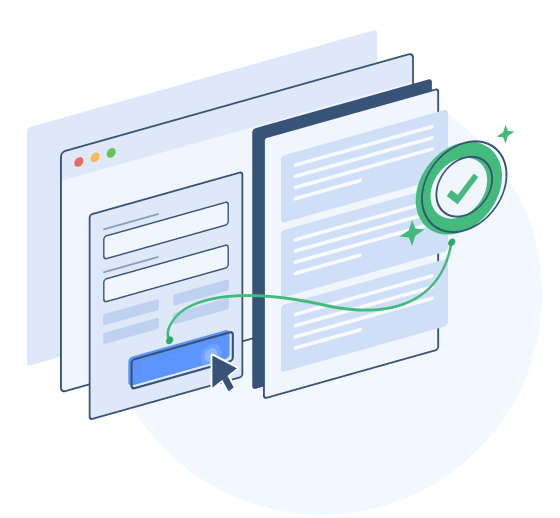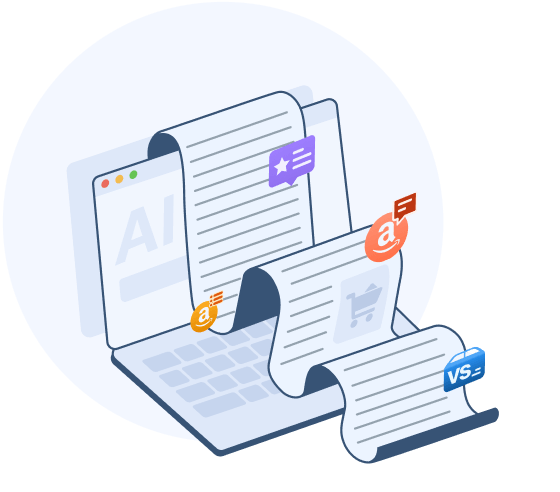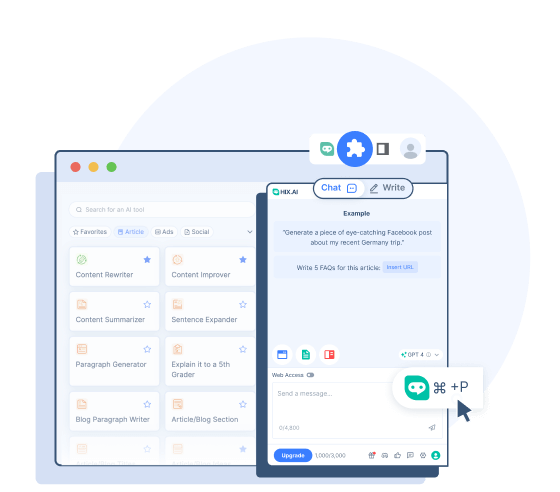Although ChatGPT has become widely popular among internet users worldwide, recent developments have encouraged more people to look for alternatives to the chatbot. In particular, since ChatGPT started utilizing the GPT-4 model, the tool has revealed some of its weak spots – it’s still in the beta phase, after all, and has struggled with more subtle tasks – in the face of a superior LLM. At the same time, users start looking for ways to get the chatbot unblocked and access it without the limitations that ChatGPT is currently facing.
Chatsonic has appeared as one of the possible solutions. As a powerful chatbot, it might be able to not only meet the standards set by ChatGPT but surpass them. Of course, there are many questions to explore here, and the most relevant answers will become apparent if we compare Chatsonic and ChatGPT directly. This article will do just that.
So, is Chatsonic better than ChatGPT? Read on to find out!
Experience ChatGPT Without Logging in
Before we commence the battle of Chatsonic versus ChatGPT, take a moment to interact with ChatGPT, a user-friendly and login-free AI chat tool.
What Is Chatsonic?

Before explaining what Chatsonic is, we should address one issue with this chatbot. Namely, keyword research has shown that many users get confused about what the service is actually called. Some of the commonly found search results included:
- “ChatSonix”
- “ChatSoni”
- “Chat Somic”
- “ChatSonuc”
- “CharSonic”
- “Sonic ChatGPT”
- “Sonic Chat AI”
- “Chat with Sonic”
- “Chat Sonic GPT”
Naturally, such a variety of misspellings only adds more confusion to the subject. Moving forward, it would be best to remember that the chatbot is called simply “Chatsonic” and refrain from wrong titles like Sonic ChatGPT or the nearly-accurate Chatsonic GPT.
Now that we’ve clarified the name, let’s look at what makes Chatsonic of interest for our discussion.
Chatsonic is part of the platform created by Writesonic. We’ve mentioned that Chatsonic GPT is almost an accurate name for the chatbot, and that’s for good reason. Chatsonic uses both GPT-3.5 and GPT-4 language models for content generation and query responses.
As a part of the Writesonic platform, Chatsonic represents one of the crucial tools for creating content. It can be combined with other powerful tools from the platform to make practically any kind of content the user wants. For instance, Writesonic includes tools like Photosonic, which utilizes AI to generate images, and Botsonic, an AI-powered tool that builds chatbots from scratch without coding.
For our purposes, we’ll look at Chatsonic in isolation from its native tool suite. After all, ChatGPT is only a chatbot, so comparing Writesonic vs. ChatGPT would be somewhat unfair. Chatsonic will need to prove whether it’s the expected game (or rather, ChatGPT) changer on its own merit.
What Is ChatGPT?

Developed by an emerging tech giant, OpenAI, ChatGPT is a cutting-edge chatbot that employs the latest solutions to deliver relatively naturally sounding output. As a breakthrough online tool, ChatGPT had a pioneering role in bringing the GPT technology to the public. With that technology came uncanny conversations between users and a machine, which instantly made ChatGPT a household name.
Even today, the strength of ChatGPT stays in the conversational area. The chatbot can cover various topics and provide somewhat reliable answers to questions of varying complexity. In that regard, ChatGPT provided a service that the world hasn’t seen before at such a level.
Yet, being the first doesn’t always mean being the best. It can be argued that several modern services offer the same advantages as ChatGPT, while some can do more than this already legendary chatbot. Chatsonic falls under such services. But is the true power of GPT unblocked with Chatsonic compared to ChatGPT? Let’s find out.
Comparing Chatsonic vs. ChatGPT
We’ll compare Chatsonic vs. ChatGPT based on several criteria:
- Basic functionality
- Speed
- Accuracy
- Pricing
Since both systems are complex and have their own strong and weak points, determining the absolute winner might not be possible. However, after a thorough examination, you’ll be able to discern which service is more appealing and better suited for your purposes.
Basic Functionality
The core functionality of Chatsonic is content generation. This tool can produce not only text, but also pixelated images. When it comes to text generation, Chatsonic can create any number of results, like articles, blogs, and social media posts. The tool can also proofread existing text and offer suggestions.
On the other hand, Chatsonic’s ability to create images isn’t on par with dedicated AI services that generate graphics exclusively. Although the graphics that Chatsonic creates may not be top-notch according to the latest standards, they are a step beyond what ChatGPT can offer.
Speaking of which, ChatGPT deals primarily with text. The chatbot receives queries via text and produces output the same way. This strong focus on textual input/output also makes ChatGPT exceptionally efficient when engaged in appropriate tasks. The tool is capable of summarizing, translating, paraphrasing, and, of course, writing texts of different lengths and complexity levels.

More impressively, ChatGPT can also write and analyze code. Furthermore, the chatbot can handle code in different programming languages. This functionality makes ChatGPT precious for programmers and all users interested in coding.
We’ve mentioned ChatGPT’s textual input, and that’s where one of the major differences between this chatbot and Chatsonic comes to light. While ChatGPT can receive input via text, Chatsonic can function through voice commands. While this difference may sound massive given the growing prevalence of voice search and similar technologies, Chatsonic doesn’t work as seamlessly as you may hope.

Although Chatsonic will receive voice commands, it will do so precisely only if the words are pronounced with utmost care. Simply put, this function may seem excitingly innovative at first glance, but it’s still way behind what modern voice search tools can provide.
Speed
Another critical aspect of performance is speed, and that’s where users may see the most difference between ChatGPT and Chatsonic. Under the same conditions (same task complexity and server load), Chatsonic can outperform the competitor, albeit not by very much.
During longer sessions, ChatGPT can start to lag as it creates output sequences. Since the chatbot generates results one word at a time, it can get stuck as the complexity of the task grows. It’s worth noting that “stuck” might be an overstatement here, as in the world of AI tools, this usually amounts to a few seconds.
Chatsonic produces its output in one piece. Instead of working sequentially, it gives the user a complete answer to a query in one go. Due to this streamlined process, the chatbot can generate the output slightly faster than ChatGPT. Plus, even in cases where speeds are comparable, Chatsonic will appear to work smoother simply because it doesn’t write out text in the same manner as ChatGPT.
Accuracy
Accuracy is arguably the most important trait of an AI chatbot. Surprisingly enough, Chatsonic is superior to ChatGPT in this regard, but that’s for a specific reason.
In terms of relevancy, for ChatGPT, 2021 is the latest year of the data the chatbot utilizes. In other words, all of the information used to train the model is about two years old. Naturally, this can affect the chatbot’s accuracy, especially when it comes to more contemporary themes.
Chatsonic benefits greatly from Google Search integration, which enables it to extract the latest data from the internet. There’s no reason to expand much further on how powerful Google is in terms of collecting information – suffice to say that being connected to this search engine provides Chatsonic with the most accurate information that can possibly be found online.
Better accuracy may seem like an open-and-shut case in favor of Chatsonic, but it’s not that simple. OpenAI is aware of the disadvantages of ChatGPT being disconnected from the latest online sources, and the developer is working diligently to remedy the issue. In particular, ChatGPT is expecting full integration with search engines, which will likely get the chatbot back in the race.
On the subject of accuracy, it’s worth mentioning that, regardless of what powers them, AI tools still aren’t completely reliable. Their results still need to be verified by a human.
Pricing
With the most important areas of both chatbots compared, it’s time to look at an aspect that may be a deal-breaker for some users: pricing.
Until recently, ChatGPT offered free access to users who register an account with OpenAI. However, this changed with the introduction of the latest GPT-4 model. Currently, free users can access GPT-3.5 with ChatGPT, while those wanting to make the most out of the chatbot will need to sign up for a subscription plan.
The monthly subscription plan for this service is called ChatGPT Plus. It’s priced at $20 per month and may allow for as many as 200 messages every three hours.
The question is how the other service compares and is Chatsonic free for all users? Chatsonic has both a free and a subscription-based model, with monthly or annual billing.
With monthly installations, Chatsonic costs $49 per month. If paid annually, the service will cost $39 per month, making it pricier than ChatGPT in any case.
Other Comparisons
The report on Chatsonic vs. ChatGPT wouldn’t be complete without mentioning that the two services aren’t the only players in the market. Out of numerous other ChatGPT alternatives, we’ve picked two options that will give you a better perspective and possibly help you decide.
HIX Chat vs. ChatGPT
Similar to Chatsonic, HIX Chat is a part of an expansive suite of AI-driven solutions from HIX.AI. It should be noted that the HIX.AI family of products is broader than that of Writesonic, but that’s beside the point here.

HIX Chat can respond to any query by using GPT-3.5 or GPT-4 (up to the user), with the added advantage of accepting textual input as well as PDF uploads. Moreover, this tool can process webpages and even YouTube videos; you only need to provide the URL.

In terms of accuracy, HIX Chat has the same advantage over ChatGPT as Chatsonic – the benefit of real-time web access. This is true whether you use the tool through its web app that allows you to try with no login or via a Chrome or Edge browser extension.
Copy.ai vs. ChatGPT
The comparison between Copy.ai and ChatGPT is quite straightforward. The chat function in Copy.ai is pretty similar to ChatGPT, but the former has a distinct advantage. Namely, Copy.ai will provide detailed resources for the results it generates.

However, the existence of resources shouldn’t immediately lead you to conclude that Copy.ai is necessarily more accurate than ChatGPT. In fact, the service is known for occasionally offering random content that doesn’t connect to the query properly. Additionally, Copy.ai can be laggy, especially when creating long-form content.
Find Your Best Alternative to ChatGPT
Since ChatGPT is continuing to develop, drawing a precise comparison between it and Chatsonic may be difficult. As it now stands, Chatsonic has a slight edge over ChatGPT, but the latter will undoubtedly develop further, returning to a more equal footing.
While you wait for time to bring the final judgment on the matter, you could try a ChatGPT alternative that’s already proven superior to all others in numerous regards. Give HIX Chat a try and see the advantages of cutting-edge chatbot technology firsthand.



